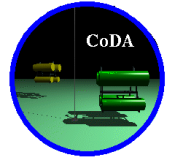Cooperating Robots
 Multiagent systems
Multiagent systems
The CoDA Project focuses on the intelligent control of groups of cooperating agents, such as autonomous underwater vehicles and other kinds of robots. In particular, CoDA concentrates on those multiagent systems (MAS) that are open systems, where agents can come and go over the lifetime of the system. For example, in an autonomous oceanographic sampling network (AOSN) tasked with long-term climate change monitoring, some AUVs will be expected to leave the system due to malfunction or being needed elsewhere, while others will arrive to replace them.
It is important that such a system be able to organize its available assets to efficiently carry out its mission, and that it be able to reorganize as its composition or its mission changes.
Two-level organization
CoDA takes the novel approach of using two organizations to balance flexibility with efficiency. When first deployed, the more intelligent agents contact each other to determine what assets the AOSN has and to plan how to best accomplish the mission. This is called the meta-level organization, or MLO. The MLO is very flexible, but not particularly efficient; its task is to design a task-level organization, or TLO, that can efficiently carry out the mission. When the situation changes, then the TLO can either adjust itself, or, if that is not possible, it can reinvoke the MLO to design a new TLO.
This project has several parts. First is the cooperation protocols and mechanisms needed for autonomous organization and reorganization. Second is the task assignment mechanism, which is based on constrained heuristic search. And third is a multi-fidelity simulation testbed that can simulate the overall system.
It is important to note that while the domain is autonomous oceanographic sampling networks, the mechanisms developed will be useful for any real-world MAS that needs to self-organize/reorganize over time.
CODA is a project of the Maine Software Agents/Artificial Intelligence Laboratory (MaineSAIL).
